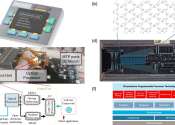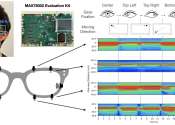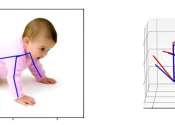AI a 'fundamental change in the news ecosystem': Expert
Artificial intelligence is shaking up journalism and in the short term will cause "a fundamental change in the news ecosystem", media expert David Caswell told AFP.
Apr 20, 2024
1
52
Business

Artificial intelligence is shaking up journalism and in the short term will cause "a fundamental change in the news ecosystem", media expert David Caswell told AFP.
Apr 20, 2024
1
52
Machine learning & AI

An artisan roastery based in the Finnish capital has introduced a coffee blend that has been developed by artificial intelligence in a trial in which it's hoped that technology can ease the workload in a sector that traditionally ...
Apr 21, 2024
0
45
Electronics & Semiconductors

A team from the Photonics Research Laboratory (PRL)-iTEAM of the Universitat Politècnica de València and the company iPRONICS have designed and manufactured a revolutionary chip for the telecommunications sector, data centers ...
Apr 15, 2024
1
71
Hi Tech & Innovation

Cornell University researchers have developed two technologies that track a person's gaze and facial expressions through sonar-like sensing. The technology is small enough to fit on commercial smartglasses or virtual reality ...
Apr 10, 2024
0
118
Computer Sciences

Artificial intelligence excels at sorting through information and detecting patterns or trends. But these machine learning algorithms need to be trained with large amounts of data first.
Mar 28, 2024
0
42
Hardware

Researchers have developed a new manufacturing technology that enables the production of high-quality oxide films and effective patterning at low temperatures and manufactured non-volatile resistive random access memory. ...
Mar 29, 2024
0
13
Robotics

A new study has shown that people modify their behavior to accommodate autonomous delivery robots, and it is this invisible "human work" that allows robots to run smoothly on the streets and needs to be considered when designing ...
Mar 27, 2024
0
29
Internet

Social media influencers have embraced artificial intelligence to spice up their content but they are also facing growing competition from AI-generated Instagramers, TikTokers and YouTubers.
Apr 7, 2024
0
6
Computer Sciences

There's a race underway to build artificial general intelligence, a futuristic vision of machines that are as broadly smart as humans or at least can do many things as well as people can.
Apr 4, 2024
0
17
Electronics & Semiconductors

Artificial intelligence (AI) tasks have become increasingly abundant and complex, fueled by large-scale datasets. With the plateau of Moore's law and end of Dennard scaling, energy consumption becomes a major barrier to more ...
Apr 3, 2024
0
21
Artificial Intelligence (AI) is the intelligence of machines and the branch of computer science which aims to create it. Major AI textbooks define the field as "the study and design of intelligent agents," where an intelligent agent is a system that perceives its environment and takes actions which maximize its chances of success. John McCarthy, who coined the term in 1956, defines it as "the science and engineering of making intelligent machines."
The field was founded on the claim that a central property of human beings, intelligence—the sapience of Homo sapiens—can be so precisely described that it can be simulated by a machine. This raises philosophical issues about the nature of the mind and limits of scientific hubris, issues which have been addressed by myth, fiction and philosophy since antiquity. Artificial intelligence has been the subject of breathtaking optimism, has suffered stunning setbacks and, today, has become an essential part of the technology industry, providing the heavy lifting for many of the most difficult problems in computer science.
AI research is highly technical and specialized, so much so that some critics decry the "fragmentation" of the field. Subfields of AI are organized around particular problems, the application of particular tools and around longstanding theoretical differences of opinion. The central problems of AI include such traits as reasoning, knowledge, planning, learning, communication, perception and the ability to move and manipulate objects. General intelligence (or "strong AI") is still a long-term goal of (some) research, while many researchers no longer believe that this is possible.
This text uses material from Wikipedia, licensed under CC BY-SA